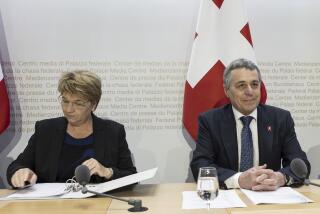London Meeting Seeks Ways to Heal Bosnia : Balkans: Dozens of nations and organizations gather to draw up blueprint for civilian relief program.
- Share via
LONDON — Like doctors clustered around an accident victim, ranking members of the international community gather here today to plot ways of stitching up bloody Bosnia. Their first move will probably be to elect a Swedish chief surgeon.
A key follow-up to the initialing of a peace accord in Dayton, Ohio, the two-day London implementation conference is the civilian flip side of the North Atlantic Treaty Organization’s military preparations to enforce the peace. The overall international effort will be launched once the peace pact is ratified in Paris next week.
Here, more than 50 countries and international agencies, including the United States and other nations providing troops for the military operation, will produce a blueprint for a civilian relief program and seek ways to coordinate it with the military effort.
A conference document prepared by the host British government for approval Saturday examines humanitarian, economic, political and constitutional issues raised by the peace agreement. “Dayton left a blank playing field. We will be looking at the best way to draw the lines before the game begins,” said a British diplomat.
Carl Bildt, a former Swedish prime minister who has been the European Union’s Bosnia negotiator, is scheduled to be formally named the senior civilian official in Bosnia. Called the High Representative, Bildt will have two principal assistants: a German and an American.
Bildt’s role will doubtless evolve, but at the outset he will be the point man and coordinator for the civilian side of the international mission to Bosnia. As plans now stand, Bildt’s direct authority will extend to a civilian police force, diplomats here say.
Parallel to the formal talks, diplomats expect corridor conversations addressing problems ranging from resettlement dilemmas to the complaints of the Serbian minority in Sarajevo. “We’ll be looking during the conference for ways of building confidence in all parts of the community,” said a British official.
There will be inevitable bureaucratic infighting, but on the overriding issues there appears to be no great dispute. “The common goal is to mobilize the international community behind a new start for the people in Bosnia-Herzegovina,” a British official said Thursday.
One planner characterized the conference as an “action-forcing event, making sure the arrangements are tied up beforehand.”
Nobody seems sure at this stage how many billions of dollars the Bosnia relief effort will wind up costing, planners acknowledged Thursday. But in the early stages, the funding, subject of a later conference all its own, takes a back seat to getting the programs up and running.
One major priority at the conference will be humanitarian issues, including care for refugees and displaced persons. Planners say about 2.7 million displaced persons will need international aid to get through the winter.
At the same time, once the peace pact begins to be enforced, international agencies will tackle explosive questions such as human rights, detainees and unresolved reports of atrocities.
*
Over the next two days, political planners whose goal is to sow seeds of democracy, tolerance and pluralism will be exploring foundations for 1996 Bosnian elections, while international economic planners will be working on reconstruction and mechanisms to jump-start what they hope will be a free-market economy in recovering Bosnia.
Along with the U.S. and Bosnia’s European neighbors, conference participants--most represented at the level of foreign minister--will include Russia, other troop contributors such as Poland, Malaysia, Pakistan, Turkey and Ukraine, and potential major aid donors such as Japan, Saudi Arabia and Oman. The former Yugoslav republics will also be represented, with Bosnian Serbs attending as members of the Belgrade-based Yugoslav delegation, as they did in Dayton.
In addition to individual countries, an alphabet soup of international agencies will attend to spell out their plans. The secretary-general of the United Nations, Boutros Boutros-Ghali, will be here, and so will leaders of the World Bank, the Office of the U.N. High Commissioner for Refugees, the International Committee of the Red Cross and the Organization for Security and Cooperation in Europe, which is charged with overseeing the planned elections.
More to Read
Sign up for Essential California
The most important California stories and recommendations in your inbox every morning.
You may occasionally receive promotional content from the Los Angeles Times.













